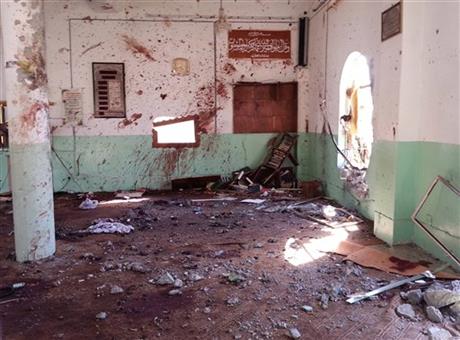
By QASSIM ABDUL-ZAHRA
Blood stains the walls and debris is strewn throughout the inside of a Sunni mosque after a suicide bomber struck during Friday prayers in the village of Umm al-Adham in Diyala province, a former militant stronghold 60 kilometers (35 miles) northeast of Baghdad, Iraq, Friday, Sept. 13, 2013. Iraq is weathering it deadliest bout of violence in half a decade, raising fears the country is returning to the widespread killing that pushed it to the brink of civil war following the 2003 U.S.-led invasion. (AP Photo)
BAGHDAD (AP) — Attacks across Iraq, including a bombing at a Sunni mosque north of Baghdad, killed 33 people Friday in the latest eruption of violence to rock the country, officials said.
The deadliest of Friday’s attacks took place when a bomb struck a Sunni mosque that was full of worshippers in the village of Umm al-Adham on the outskirts of Baqouba, a former militant stronghold 60 kilometers (35 miles) northeast of Baghdad, police officials said.
Police said the blast killed 30 people and wounded at least 45.
Iraq is weathering its deadliest bout of violence in half a decade, raising fears the country is returning to the widespread killing that pushed it to the brink of civil war following the 2003 U.S.-led invasion.
In the northern city of Mosul, police said a roadside bomb killed two soldiers and wounded two others. Also, authorities said gunmen shot and killed Khalaf Hameed, a local municipal official in Shora district, just south of Mosul.
Officials in nearby hospitals confirmed the causality figures for all the attacks. All officials spoke on condition of anonymity because they were not authorized to talk to the media.
The months-long surge of bloodshed is taking place against the backdrop of rising tensions between Iraq’s Sunni and Shiite Muslims. The tensions are being inflamed in part by the sectarian divisions reflected in the civil war in neighboring Syria.
Members of Iraq’s Sunni Arab minority have been protesting against the Shiite-led government since December, angered over what they see as second-class treatment of their sect and what they see as unfair application of tough anti-terrorism measures. Attacks surged after a deadly crackdown on a Sunni protest camp by security forces in April.
There was no immediate claim of responsibility for Friday’s attacks.
Al-Qaida’s local branch, known as the Islamic State of Iraq and the Levant, and other Sunni extremists have tried to harness the anger of many Sunnis, even as more moderate members of the sect appeal for calm.
Al-Qaida has claimed responsibility for a number of large-scale bombings in recent months and is believed to be behind other coordinated attacks. It frequently targets Shiite civilians, members of the security forces and those seen to be closely tied to the country’s Shiite-led government.
There has also been a spike in attacks on Sunni mosques in recent months. While it is possible that Sunni extremists could be to blame, Shiite militias that had been largely quiet for years may also be behind those assaults.
More than 4,000 people have been killed in violent attacks since the start of April, including 804 just in August, according to United Nations figures.
Baqouba, where the bomb targeted the Sunni mosque, was hit with deadly violence earlier this week. Three car bombs targeting outdoor markets killed at least 10 civilians and wounded more than 30 there Tuesday.
Also on Friday, al-Qaida in Iraq claimed responsibly for a failed assassination attempt that took place early this month against a prominent Sunni militia leader opposed to al-Qaida, according to a statement posted on a militant website.
Al-Qaida said that three suicide bombers tried to storm the house of Wisam al-Hardan in Baghdad after attacking all the checkpoints leading to his residence.
Al-Hardan was recently appointed by the Iraqi prime minister to lead the anti-Al-Qaida Sunni militia known as Sahwa. The Sunni leader was not hurt in the attack that killed seven people, including six of his bodyguards.
Sahwa fighters joined U.S. troops in the war against al-Qaida at the height of Iraq war. Ever since, it has been a target for Sunni insurgents who consider them traitors.
___
Associated Press writers Adam Schreck and Sameer N. Yacoub contributed to this report.


